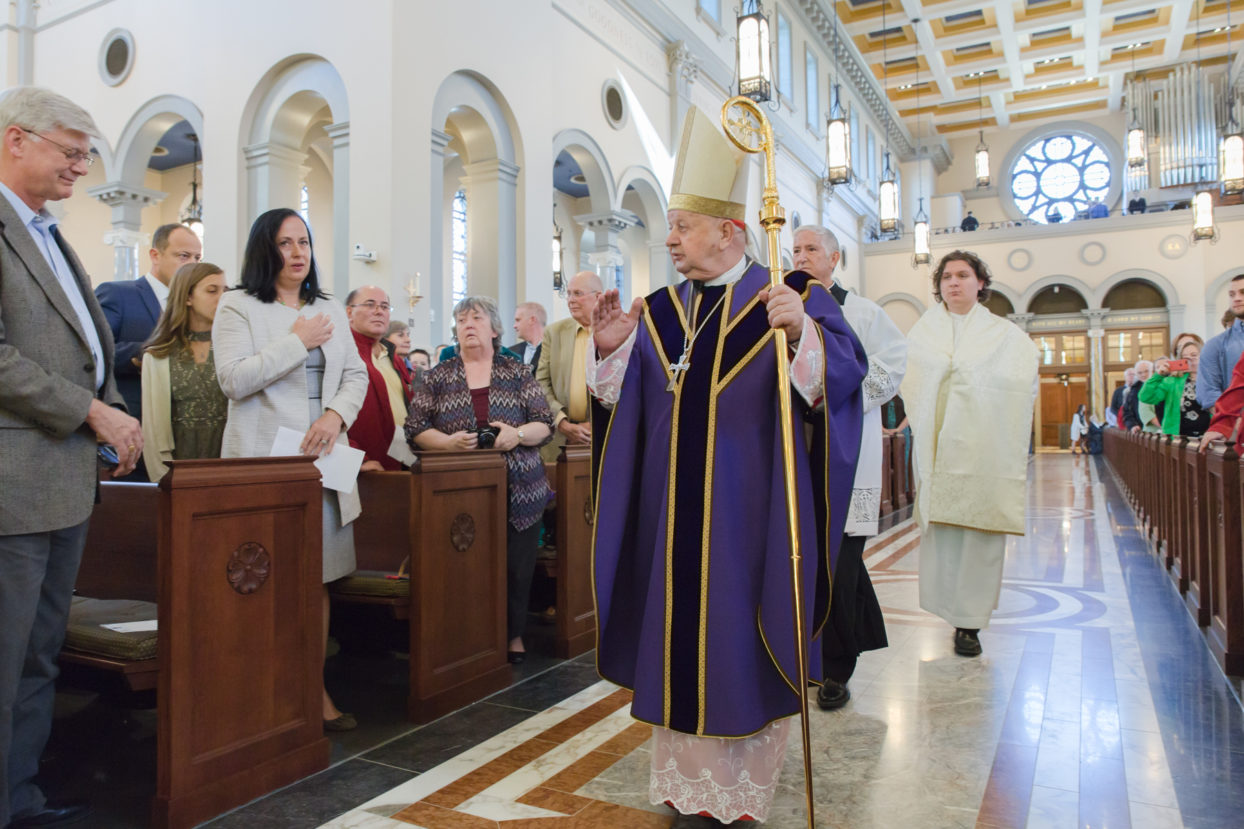Masses led by cardinal, apostolic nuncio give international flavor to dedication weekend
By Bill Brewer
The dedication of the Cathedral of the Most Sacred Heart of Jesus was a sacred moment in history for the Diocese of Knoxville in more ways than one.
Not only did Bishop Richard F. Stika breathe life March 3 into the diocese’s new mother church, where the Holy Spirit now resides, history was made again on March 4 when Cardinal Stanisław Dziwisz and Archbishop Christophe Pierre celebrated Masses in Polish and Spanish.
Cardinal Dziwisz, archbishop emeritus of Kraków, Poland, and longtime personal secretary to Pope St. John Paul II, attended the cathedral dedication at the invitation of Bishop Stika and Cardinal Justin Rigali. Pope St. John Paul II is co-patron of the Diocese of Knoxville and established the diocese in 1988.
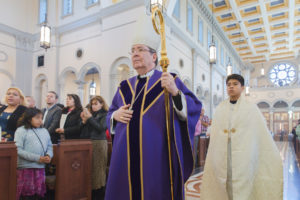 Archbishop Pierre, apostolic nuncio to the United States, represented Pope Francis at the dedication Mass and delivered the official papal decree formally establishing the Cathedral of the Most Sacred Heart of Jesus as the diocese’s mother church.
Archbishop Pierre, apostolic nuncio to the United States, represented Pope Francis at the dedication Mass and delivered the official papal decree formally establishing the Cathedral of the Most Sacred Heart of Jesus as the diocese’s mother church.
Originally from France, the Vatican’s ambassador to the United States also served as apostolic nuncio to Mexico before his appointment by Pope Francis to the United States in 2016.
Cardinal Dziwisz attracted Catholic faithful from around the country who were either Polish or from Polish descendants. While many among the some 400 in attendance spoke the Polish language, a number of them did not, but still wanted to witness Cardinal Dziwisz, whose role in Church history is chronicled, celebrate Mass in the new cathedral.
“Listening to the words of today’s Gospel describing Jesus standing in Jerusalem’s Temple, we may spontaneously have in mind this majestic Cathedral of the Most Sacred Heart of Jesus in which we are celebrating the Eucharist and which we solemnly consecrated,” Cardinal Dziwisz said.
“From now on, this church, which is the new cathedral in the heart of the Diocese of Knoxville, became the house of God. It became a sacred space in which God wishes to be adored, wants to meet with His people, speak to them, and strengthen them with life-giving sacraments on the paths leading to eternity,” he added.
Cardinal Dziwisz, who extended greetings from Poland and the Catholic Church in Kraków, noted how 2018 marks the 40th anniversary of Pope St. John Paul II’s election to the papacy.
“This year, in October, it will be 40 years from his election to St. Peter’s capital, the election of a cardinal who was from behind the ‘Iron Curtain’ of communism, which was a huge surprise, but it also aroused great hopes,” the cardinal said. “Today, from the perspective of time, we know that these hopes came true. The Holy Father, since the very beginning of his papal service, reminded everyone not to be afraid to be entirely open to Christ in the spaces of their family, social, economic, and cultural lives.”
Cardinal Dziwisz pointed out that the Holy Father’s words also arrived in countries that were trying to close Christ’s access to people, “in which Godless ideology wanted to deprive a man of the greatest treasure, which is God.”
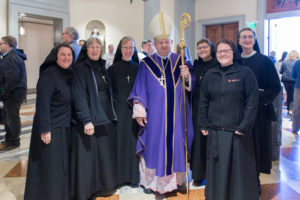 “We know that after 10 years of his pontificate, a totalitarian communist system collapsed and ended in Poland and other countries of Central and Eastern Europe. There is no doubt that in this epic event Pope St. John Paul II had his great contribution. He did not have any army, any physical power. The truth about God and man created in the image and likeness of God and called to live forever in God were his weapons. The Gospel that is the Good News of Jesus Christ the Redeemer of man and the only Savior of the world were his weapons,” the cardinal noted.
“We know that after 10 years of his pontificate, a totalitarian communist system collapsed and ended in Poland and other countries of Central and Eastern Europe. There is no doubt that in this epic event Pope St. John Paul II had his great contribution. He did not have any army, any physical power. The truth about God and man created in the image and likeness of God and called to live forever in God were his weapons. The Gospel that is the Good News of Jesus Christ the Redeemer of man and the only Savior of the world were his weapons,” the cardinal noted.
Cardinal Dziwisz said he witnessed firsthand how evil tried to silence God’s voice behind the Iron Curtain.
“The dark forces of evil were trying to remove and kill the valiant witness of faith, who was dangerous to all regimens fighting with God and man. The Holy Father paid the price for his testimony,” he said. “We remember the dramatic assassination attempt from May 13, 1981, at the beginning of his pontificate. I was then at his side. I was holding him in my arms when he collapsed and his white cassock was getting red. Then the Divine Providence saved his life so he could continue to serve the Church and the world. And he was serving continuously for many years, until the end, until his blessed death.”
Cardinal Dziwisz told the faithful that he feels an obligation to bear witness to St. John Paul II — his life of prayer, his daily work for the Church, his concern for the fate of the world.
During the March 3 dedication Mass for the new cathedral, Cardinal Dziwisz presented Bishop Stika with two relics from Pope St. John Paul II: a favorite stole the pope frequently wore during his papacy and a first-class relic of drops of the pope’s blood. And on March 2, the cardinal received an enthusiastic welcome from students at Knoxville Catholic High School, where he stopped and visited.
The cardinal welcomed the opportunity to talk to “America’s Polonia,” the U.S. Polish community, with whom the Holy Father enjoyed a popular relationship.
“The Holy Father always emphasized that Polonia should strengthen its identity; protect values of the Polish culture, heritage passed to us through a thousand years of faith in our native country. At the same time, he was stressing that Polonia should contribute to the life of the American nation, in the place which was always welcoming for Poles and many of our compatriots who were able to fulfill and still are fulfilling their dreams.
“In this country, the spiritual exchange of gifts is ongoing. We can share with others precious items of our culture and tradition and, at the same time, we can open ourselves to gifts of other cultures, other values. Such exchange enriches us, expands our hearts, and makes it more open to the richness of the cultures, languages, and traditions,” Cardinal Dziwisz told the Polish community.
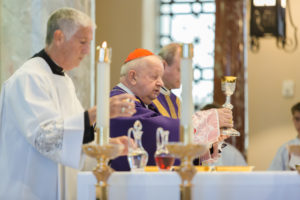 Cardinal Dziwisz was accompanied by Father Miroslaw Krol, priest-secretary to the cardinal, and Father Tomasz Szopa, priest-assistant to the cardinal, who also served as the cardinal’s translator.
Cardinal Dziwisz was accompanied by Father Miroslaw Krol, priest-secretary to the cardinal, and Father Tomasz Szopa, priest-assistant to the cardinal, who also served as the cardinal’s translator.
Lech Biernacki, a native of Poland, traveled from Queens, N.Y., to Knoxville just to see Cardinal Dziwisz. He heard about the cardinal’s visit in conjunction with the cathedral dedication from Andrew Cieslik, who was traveling with Cardinal Dziwisz.
“I am from Warsaw, and I don’t recall seeing him in Poland. I had to come to the United States just to see him,” said Mr. Biernacki, who was with a group of native Poles who sang during the cultural choirs’ performances for the dedication Mass.
“It was great. It definitely was worth the trip. An event like this helps you grow in faith,” he said. Mary and Frank Dale of Knoxville brought their four daughters to the Mass in Polish. Although they attend an Orthodox church, the Dales wanted to see the new cathedral and Cardinal Dziwisz.
“It was wonderful,” Mr. Dale remarked about the powerful combination. His 18-year-old daughter, Emma, called the cathedral “beautiful,” acknowledging that she was distracted during Mass by the cathedral’s art and architecture. Archbishop Pierre celebrated Mass before the largest gathering yet at the new cathedral. Some 1,200-1,300 people heard the papal nuncio, who was joined at the altar by Father Rafael Capó, executive director of the Southeast Pastoral Institute in Miami, and Father Arthur Torres Barona, associate pastor of the cathedral.
He immediately connected with hundreds of faithful, asking them in fluent Spanish where they were from.
“I am French, can you tell?” he asked. “I do have a French accent, but I have spent the last 10 years of my life in Mexico. There are many Mexicans here today, aren’t there? Who here is Mexican? Oh, my goodness! Who here is not Mexican?”
Spanish-speaking parishioners from a number of countries attended the Mass and were drawn by Archbishop Pierre as much as by the new cathedral.
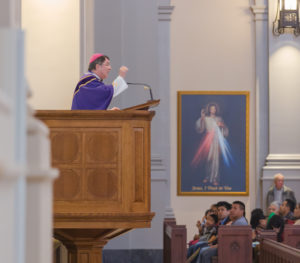 “I am so happy to be here today, and I thank the Lord and Bishop Stika for inviting me to the first Spanish Mass at your new church. And today being precisely the Third Sunday of our Lenten journey makes it so important because it leads us in our preparation, while the Lord asks us to give up our lives so we can then celebrate fully during Holy Week, and then finally on Easter Sunday,” the archbishop said.
“I am so happy to be here today, and I thank the Lord and Bishop Stika for inviting me to the first Spanish Mass at your new church. And today being precisely the Third Sunday of our Lenten journey makes it so important because it leads us in our preparation, while the Lord asks us to give up our lives so we can then celebrate fully during Holy Week, and then finally on Easter Sunday,” the archbishop said.
Archbishop Pierre shared with them that over the decade he spent in Mexico he became familiar with their culture, their lives, and their faith.
“I have observed that our faith, our relationship with Jesus and with God, is very much related to our relationship with each other, with our families, and with our neighbors. So, because of this, it seems fitting to me that we have come from afar in order to offer the sacrifice of the Lord’s Eucharist so as to not lose that precisely magnificent tradition that also has come from afar,” he said.
“We cannot forget that our faith is based on memory. The path of our lives begins from birth, when we are just little boys and girls, but then comes a certain moment when we find the Lord … through the testimony of a mother, a father, a grandparent, or from the parish, and then we have to keep going forward from there. So it gives me great joy to see all you parents with your children, because you know the importance of being together in this way, today particularly in this beautiful and dignified church. Thankfully, I know you are passing onto them the faith, and helping us to pass it, as well as an experience and an encounter with God that is so important,” he continued.
Archbishop Pierre appealed to the faithful to do as the Samaritan woman in the Gospel did, to have an encounter with Jesus Christ, who can lift all of our burdens and fill our seemingly unquenchable thirst.
“Brothers and sisters, hopefully during this Lent, and through our preparation for this special manifestation of God in His death and in His resurrection, we will be given magnificent opportunities for us to meet with the Lord. He is right here, and he is asking me and each one of you to come and meet with Him. With God, there is nothing hidden or false; there is only truth. With God, there is no separation; with God, there is no hate. With God, there is only unity, which is found with family and friends … With God, there is only love … with God, there is no fear. With God, there is happiness. God bless all of you.”

